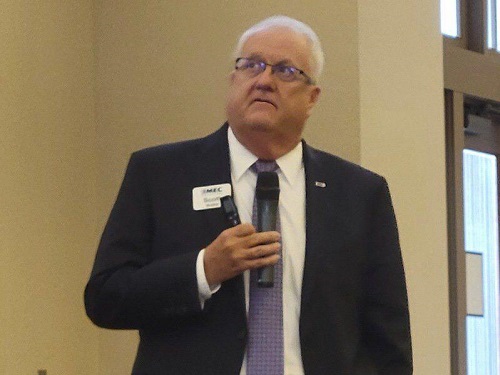
MEC president Scott Waller speaks to Meridian business leaders about the state’s economic climate Tuesday at the MSU Riley Center.
6.15.22 – Meridian Star –
Business and economic development leaders throughout Meridian gathered at the MSU Riley Center Tuesday to hear from the Mississippi Economic Council about the state of Mississippi’s business climate.
In a new report published this year, the MEC found the number one issue plaguing Mississippi businesses was the lack of qualified employees.
MEC president Scott Waller said the statewide chamber of commerce had gathered data from business leaders throughout the state in 51 meetings in 18 communities last fall.
In those meetings, he said, MEC heard employers’ concerns and used the data to set goals for moving Mississippi’s economy forward.
“The very first bullet point there, the stigma that a student who doesn’t attend four-year college is not successful, is something we still deal with today,” he said. “This came up in practically all 51 meetings.”
Addressing the lack of qualified workers, Waller said, will require skilled workers in trades, certificate programs and other industries that don’t require a four-year degree. Rebranding higher education to include community college degrees and trade programs, he said, is crucial to the state’s success.
“We’ve got to figure out how to deal with that so that every single career pathway is valued equally,” he said. “When we can get to that point, we can begin to see a big difference in how we develop workforce in our state.”
Waller said MEC set a goal of 55% of Mississippi’s workforce having some sort of higher education, either a four-year degree, community college degree or skills certificate, by 2030.
Currently, he said, 44% of working-age Mississippians have a higher education credential, compared to 51% nationally.
In its discussions with business leaders, Waller said MEC also found the need for transportation improvements, both public transportation and revitalizing the state’s road and bridge infrastructure.
Business leaders are also concerned about access to healthcare, difficulties accessing capital for small businesses and minority-owned businesses, expanding and improving childcare, expanding broadband infrastructure and creating opportunities for young professionals to get involved in their communities.
Mississippi, Waller said, has a marketing problem, and sharing what makes the state a great place to live is vital to ensure that the state’s economy and workforce continue to grow.
In his discussions throughout the state, Waller said 50% to 70% of each group identified Mississippi’s image as the second biggest challenge the state faces.
“If we don’t find a way to tell our story of what’s happening here in Mississippi, I can assure you somebody out there is telling this story,” he said. “And chances are they’re not telling the story that we want to hear, or they’re not telling the story that’s really the truth about what we are as a state.”
Using information gathered from its meetings, Waller said MEC outlined a set of goals for the next 3-5 years. The plan, titled Securing Mississippi’s Future, outlines what the state’s chamber of commerce wants to achieve addressing some of these issues.
Waller encouraged business and community leaders to read the goals, which can be found at msmec.com, and chose one to address in their own community or business.
“That’s how a fire gets started. That’s how it grows,” he said. “If we can do that all across the state, and show examples of success, we have the opportunity to not only grow your own community but grow our state.”
